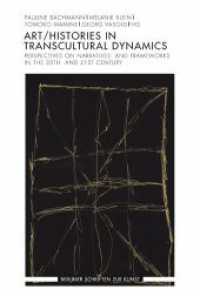Full Description
Decades-old calls to recognise China's significance for anthropological theory and the social sciences are more urgent than ever. Yet, Chinese-grounded ideas remain marginal, with China often seen as an 'Other' rather than a source of widely applicable theory. Drawing on East Asian postcolonial scholarship, this volume argues that without taking China seriously as a knowledge producer and a key agent in a post-global world, social scientists risk misinterpreting the global present. As Western globalisation wanes and anthropology reassesses the relationship between ethnography and theory, we show how 'China' must be understood as an ordinary, integral context for research worldwide.
Contents
Introduction: China as context - Di Wu, Andrea E. Pia, Ed Pulford
Part I: China is context
1 To grow affinity with whom? Shifting modes of engagement of Chinese Buddhism in East Africa- Yu Qiu
2 China as ethnographic absent presence: mssed encounters in the Polish and Mexican amber markets - Alessandro Rippa
3 Russian names for China and their relational implications - Caroline Humphrey
4 Insurgent instruction: Confucius Institutes and the production of soft power - Jennifer Hubbert
Part II: The neglect of China
5 For the sake of simplicity: no China, no context - Hans Steinmüller
6 'The Malinowski-Freedman Thesis' and 'Grammars of Anthropology on China': a reflection based on the research of Fei Xiaotong - Tan Tongxue (trans. Di Wu)
7 What are you doing it for? Thoughts on a pragmatistic approach to China anthropology -Yang Zhan
Commentary: China as science fiction: recontextualising 'China as context' -Uradyn E. Bulag







